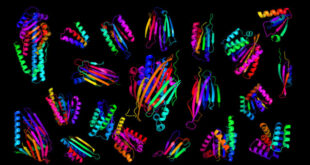Capsaicin, a compound found in peppers of the genus Capsicum, inhibits the growth of breast cancer cells, according to a team of researchers in Germany.

Capsaicin is found in Capsicum peppers. Image credit: Hans Braxmeier.
The team’s experiments were carried out with the SUM149PT cell culture, a model system for a particularly aggressive type of breast cancer, i.e. the triple-negative type.
In the cultivated cells, the researchers detected a number of typical olfactory receptors.
“One receptor occurred very frequently; it is usually found in the fifth cranial nerve. It belongs to the so-called transient receptor potential channels and is named TRPV1 (transient receptor potential vanilloid receptor),” they explained.
“That receptor is activated by the spicy molecule capsaicin as well as by helional, a scent of fresh sea breeze.”
The authors confirmed the existence of TRPV1 in tumor cells in nine different samples from patients suffering from breast cancer.
They activated the TRPV1 receptor in the cell culture with capsaicin or helional, by adding the substances to the culture for a period of several hours or days. As a result, the cancer cells divided more slowly.
Moreover, the treatment caused tumor cells to die in larger numbers.
The surviving cells were no longer able to move as quickly as heretofore; this implies that their ability to form metastases in the body was impeded.
“If we could switch on the TRPV1 receptor with specific drugs, this might constitute a new treatment approach for this type of cancer,” said Prof. Hanns Hatt, from the Department of Cell Physiology at the Ruhr-University Bochum.
“An intake via food or inhalation is insufficient for this purpose.”
Earlier studies had demonstrated that the chemical arvanil – with a chemical make-up similar to that of the spicy molecule capsaicin – was effective against brain tumors in mice; it reduces tumor growth in the animals. Due to its side effects, however, this substance is not approved for humans.
In addition to capsaicin and helional, the endovanilloids, produced naturally in the body, also activate the TRPV1 receptor.
The team’s findings were published this month in the journal Breast Cancer: Targets and Therapy.
_____
Lea V. Weber et al. 2016. Expression and functionality of TRPV1 in breast cancer cells. Breast Cancer: Targets and Therapy 8: 243-252; doi: 10.2147/BCTT.S121610
 #Bizwhiznetwork.com Innovation ΛI |Technology News
#Bizwhiznetwork.com Innovation ΛI |Technology News



